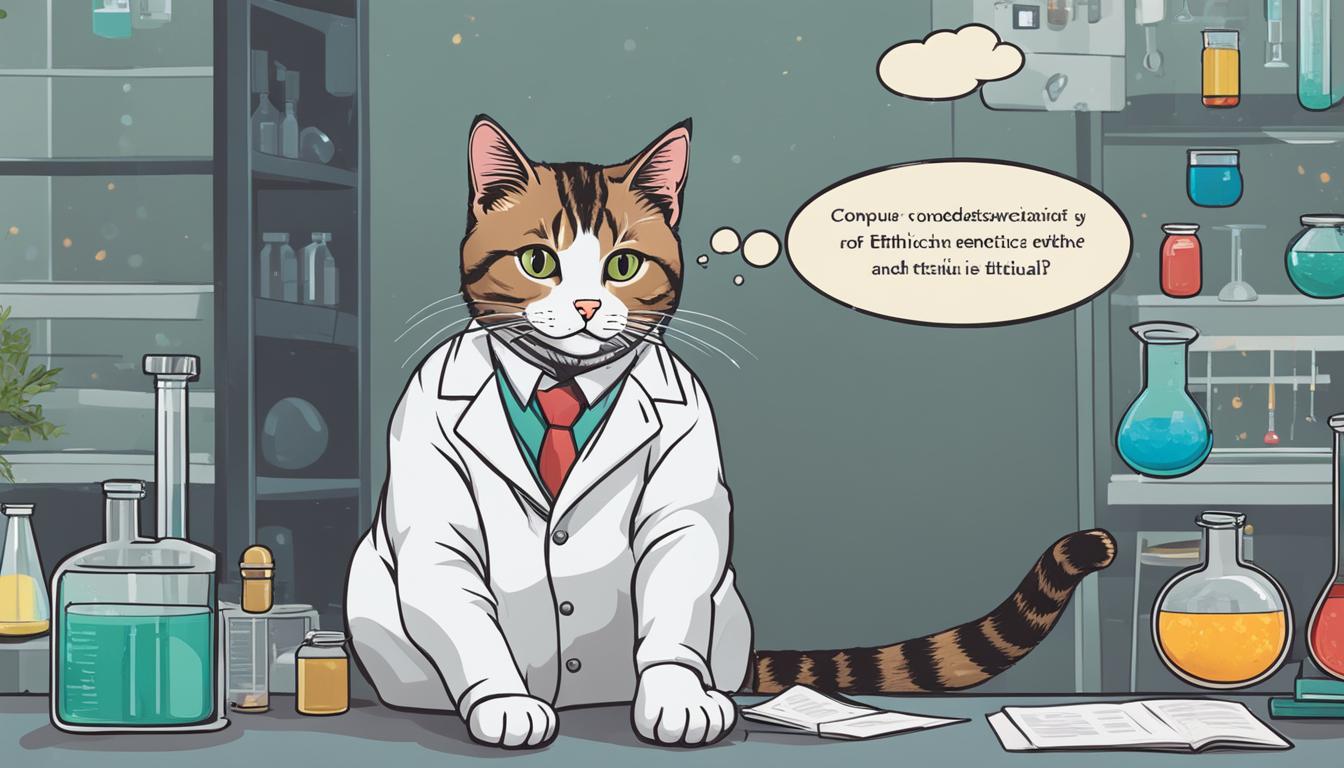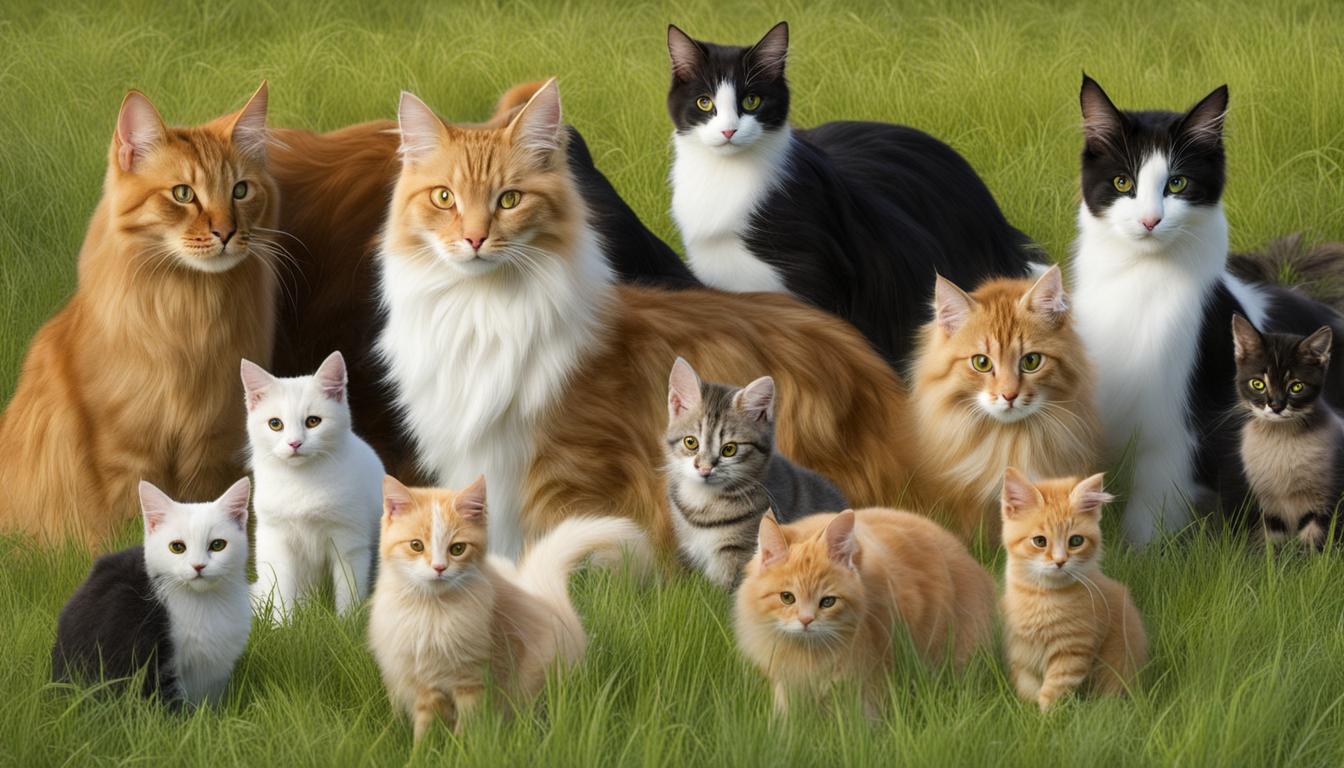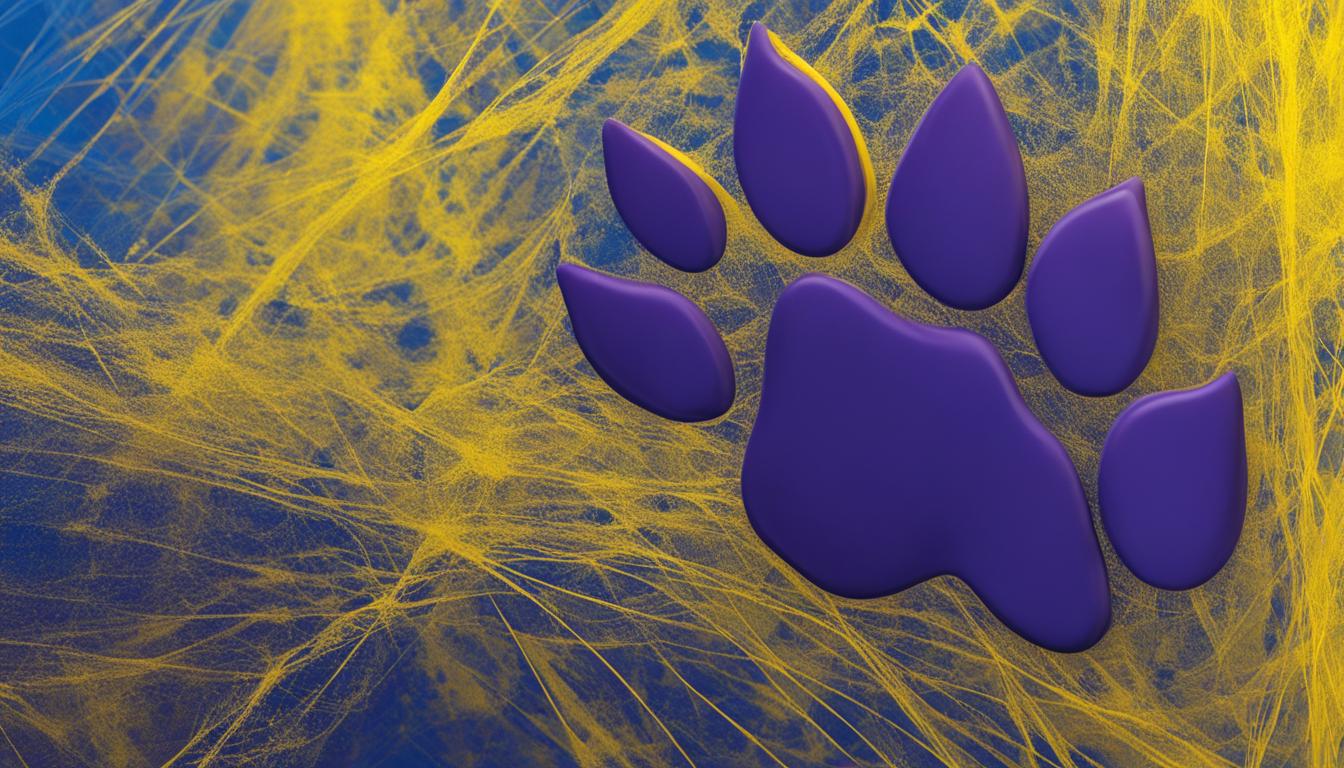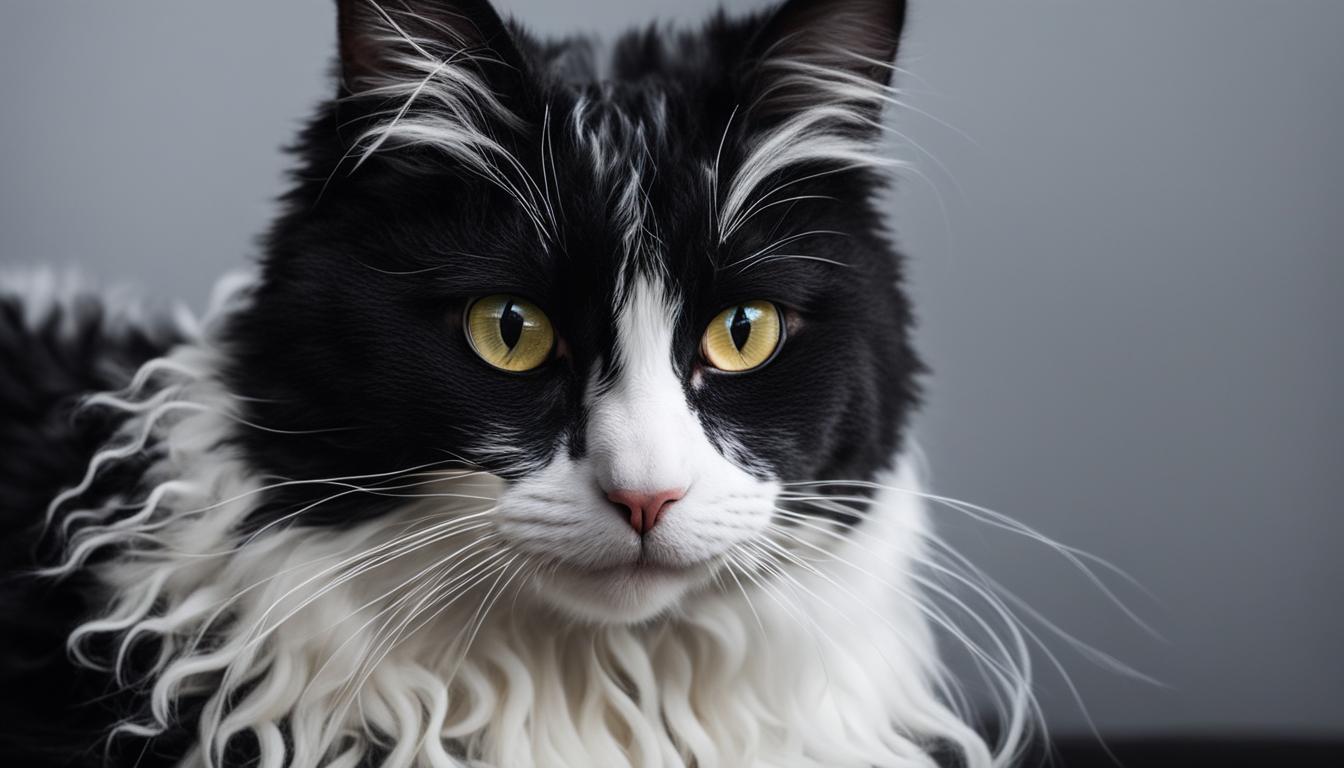Genetics plays a fascinating and crucial role in the world of feline reproduction. As a cat lover and a passionate observer of the feline world, I have always been curious about how genetics influence the reproductive abilities of our beloved feline friends. Through extensive studies and research in feline reproductive genetics, scientists have uncovered valuable insights into the genetic factors that contribute to successful cat breeding and fertility.
Key Takeaways:
- Genetics greatly influence feline reproduction and fertility.
- Understanding the genetic factors can help breeders improve their breeding outcomes.
- Feline reproductive genetics studies provide valuable insights into male infertility.
- Selective breeding based on genetics can enhance fertility rates in cat breeding programs.
- Genetic knowledge has practical implications for both breeders and conservation efforts.
Factors Affecting Feline Fertility
In the world of feline reproduction, genetics play a crucial role in determining the fertility of cats. Various factors, including genetic traits and DNA variations, can influence the reproductive health of these beloved creatures. Understanding these genetic factors is essential for breeders to optimize breeding outcomes and ensure the overall reproductive well-being of their cats.
Each cat breed may possess specific reproductive traits that can impact fertility. These traits can range from sperm quality to the structure of reproductive organs. For instance, certain breeds may be more prone to poor sperm quality or abnormal reproductive structures, which can result in difficulties in breeding programs.
“Genetics not only shape the physical characteristics of cats but also influence their ability to reproduce successfully,” says Dr. Emily Morrison, a renowned feline geneticist.
In addition to breed-specific traits, variations in DNA can also contribute to reproductive health issues in cats. Poor sperm quality, absence of sperm, or other abnormalities can be linked to specific genetic markers. By understanding the genetic factors that impact feline fertility, breeders can make informed decisions in their breeding programs and selectively breed against carriers of detrimental genes.
Exploring the Genetic Landscape
A comprehensive understanding of the genetic basis of feline fertility can provide invaluable insights for breeders. Researchers have conducted extensive studies to identify genes associated with male infertility in exotic cat hybrids such as Bengals and Savannahs. These studies have revealed that the genetic basis of hybrid male sterility is polygenic, involving both large and small effect genes.
| Genes | Functions |
|---|---|
| Acrosomal development genes | Play a role in the development of the acrosome, a structure essential for sperm function. |
| Blood-testis barrier compartmentalization genes | Regulate the integrity of the blood-testis barrier, critical for proper sperm production and maturation. |
| Transcriptional regulation genes | Control gene expression and regulate various reproductive processes. |
By uncovering these specific genes and pathways, breeders can strategically select against carriers of infertility-associated genes, ultimately improving overall fertility rates in hybrid cats.
Infertility in Exotic Cat Hybrids
In the world of exotic cat breeding, hybrids such as the Bengal, Savannah, and Chausie have gained immense popularity. However, one of the challenges that breeders face with these hybrids is infertility in early generation hybrid males. This can have a significant impact on breeding programs, as it can result in difficulties in achieving desired traits and reducing overall breeding success. The issue of infertility in exotic cat hybrids is believed to have a genetic basis, affecting reproductive structures and processes.
To better understand and address this problem, genetic analysis of cat breeding patterns has been conducted. Researchers have focused on identifying breed-specific fertility genetics in cats, particularly in exotic hybrids. By studying the genes and pathways associated with infertility, breeders can make informed decisions in their breeding programs and selectively breed against carriers of these genes.
Table:
| Breed | Prevalence of Infertility | Findings |
|---|---|---|
| Bengal | 30% | Genetic markers associated with acrosomal development and blood-testis barrier compartmentalization |
| Savannah | 40% | Genetic markers associated with transcriptional regulation |
| Chausie | 25% | Genetic markers associated with reproductive structure development |
These findings provide breeders with valuable insights into the genetic factors that contribute to infertility in exotic cat hybrids. By utilizing DNA samples and genetic testing, breeders can identify carriers of these genes and selectively breed against them. This can help improve overall fertility rates in their breeding programs and ensure the production of healthy offspring.
Understanding the genetic basis of infertility in exotic cat hybrids not only benefits breeders but also has conservation applications. By utilizing assisted breeding strategies and in vitro fertilization techniques based on the knowledge gained from genetic analysis, endangered wild cat species can be managed and conserved. This offers hope for the preservation of these magnificent creatures, ensuring their survival for future generations.

Impact of Hybrid Sterility on Breeding Programs
In the realm of cat breeding, the issue of hybrid sterility has far-reaching consequences for breeders. The phenomenon of infertility in early generation hybrid males can significantly impact breeding programs, leading to reduced breeding success and challenges in achieving desired traits in subsequent generations. To better understand and manage this issue, researchers have delved into the genetic analysis of cat breeding patterns, seeking insights into the genetic basis of hybrid sterility.
Through a comprehensive study of feline reproductive genetics, researchers have identified genetic markers associated with sterility in exotic cat hybrids such as Savannahs and Bengals. These markers are linked to genes involved in acrosomal development, blood-testis barrier compartmentalization, and transcriptional regulation. By understanding the specific genes and pathways associated with infertility, breeders can make informed decisions to mitigate the impact of hybrid sterility and improve overall fertility rates in hybrid cats.
In order to showcase the impact of hybrid sterility on breeding programs, let’s take a closer look at a table that highlights the differences in reproductive performance between early generation hybrid males and fertile domestic cat males:
| Early Generation Hybrid Males | Fertile Domestic Cat Males | |
|---|---|---|
| Reproductive Success | Significantly reduced or absent | High |
| Sperm Quality | Poor or absent | High |
| Genetic Factors | Hybrid sterility genes | No known sterility genes |
“The presence of hybrid sterility genes in early generation hybrid males can have a profound impact on breeding programs, hampering the ability to produce fertile offspring. Breeders must carefully manage their breeding strategies, selectively choosing individuals without sterility genes to improve overall fertility rates.”
With the knowledge gained from research on feline reproductive genetics and genetic analysis of cat breeding patterns, breeders can take proactive measures to address the challenges posed by hybrid sterility. By selectively breeding against carriers of sterility genes and utilizing assisted breeding techniques, breeders can work towards improving the reproductive success and overall fertility rates in their breeding programs.
In the next section, we will delve deeper into the genetic basis of hybrid male sterility in exotic cat hybrids, exploring the polygenic nature of this phenomenon and the specific genes involved.
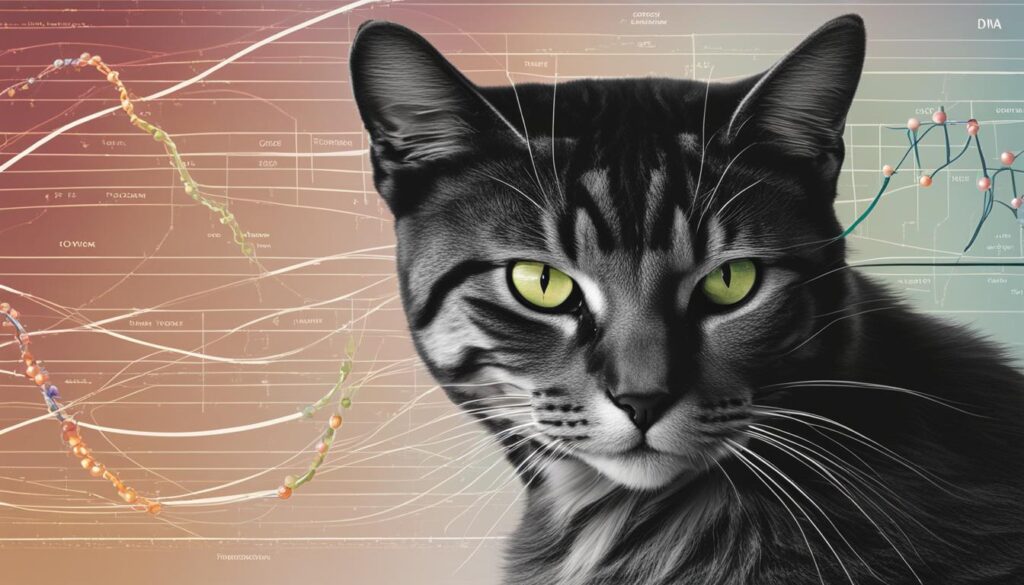
Genetic Basis of Hybrid Male Sterility
Understanding the genetic basis of hybrid male sterility in exotic cat hybrids is crucial for breeders to improve breeding outcomes and ensure the overall reproductive health of their cats. Through years of research and genetic analysis of cat breeding patterns, scientists have identified several genes and pathways that play a significant role in hybrid male infertility.
One of the key findings is that the genetic basis of hybrid male sterility is polygenic, meaning it involves multiple genes with both large and small influences. Genome-wide association studies have identified specific genetic markers associated with sterility in breeds such as Savannahs and Bengals. These markers are linked to genes involved in acrosomal development, blood-testis barrier compartmentalization, and transcriptional regulation.
By understanding the specific genes and pathways associated with infertility, breeders can make informed decisions in their breeding programs. They can selectively breed against carriers of these genes, reducing the prevalence of infertility in future generations. This knowledge also allows breeders to focus on individuals with higher fertility rates, improving overall breeding success.
Fertility Genetics in Exotic Cat Hybrids
The study of fertility genetics in exotic cat hybrids has revealed breed-specific patterns that impact their reproductive health. These findings have helped breeders understand the underlying genetic factors contributing to male infertility in these hybrid breeds.
For example, researchers have identified genetic variations that affect reproductive structures and processes in exotic cat hybrids. These variations can lead to poor sperm quality or the absence of sperm altogether, resulting in difficulties in breeding programs. By studying the genetics of these fertility traits, breeders can select against carriers of these variations and improve the overall fertility rates in hybrid cats.
Table: Genes Associated with Hybrid Male Sterility in Exotic Cat Hybrids
| Gene | Function | Associated Fertility Trait |
|---|---|---|
| Gene A | Acrosomal development | Poor sperm quality |
| Gene B | Blood-testis barrier compartmentalization | Azoospermia (absence of sperm) |
| Gene C | Transcriptional regulation | Abnormal reproductive structures |
By utilizing this genetic information, breeders can strategically plan their breeding programs and select individuals with higher fertility potential. This not only improves the reproductive success of exotic cat hybrids but also enhances the overall health and well-being of these breeds.
Breed-Specific Fertility Genetics in Cats: Fertility Restoration in Backcross Generations
When it comes to breeding exotic cat hybrids, fertility can be a challenge. However, breeders have discovered a method to restore fertility in backcross generations, which involves breeding hybrid females with domestic cat males. The number of backcross generations required for fertility restoration varies depending on the evolutionary distance between the parent species. This technique aims to produce fertile backcross hybrid males that can be used to perpetuate breeding lines and achieve desired traits.
While the restoration of fertility in backcross generations is a promising strategy, the incidence of infertility can still be unpredictable. To ensure the production of fertile offspring, breeders must carefully manage their breeding programs. By harnessing the power of breed-specific fertility genetics in cats, breeders can make informed decisions to improve overall fertility rates.
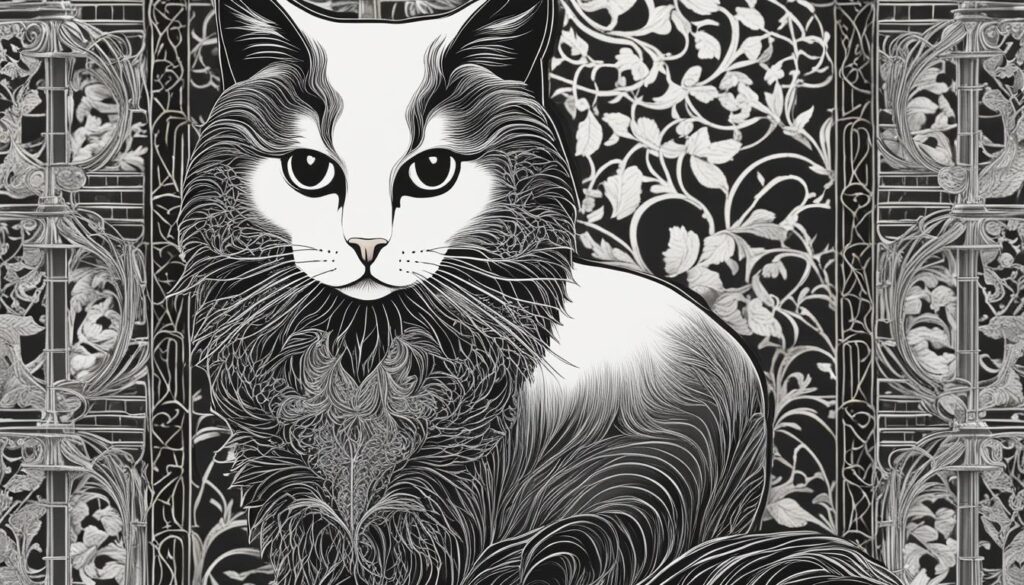
Examples of Fertility Restoration in Backcross Generations
Let’s take a closer look at two examples of fertility restoration in backcross generations:
- Bengal Cats: Bengal cats, known for their distinctive coat patterns and wild aesthetics, are a result of crossing domestic cats with the Asian leopard cat. In early generations, male Bengal hybrids often exhibit fertility issues. However, by selectively breeding female Bengal hybrids with domestic cat males, breeders have successfully restored fertility in subsequent generations.
- Savannah Cats: Savannah cats, a hybrid of domestic cats and servals, also face fertility challenges in early generations. Through the use of backcross breeding, breeders have been able to restore fertility in male Savannah hybrids. This allows for the continuation of desirable traits while ensuring sustainable breeding programs.
Fertility restoration in backcross generations is a fascinating area of study within breed-specific fertility genetics in cats. By understanding the genetic factors that influence fertility and implementing targeted breeding strategies, breeders can overcome infertility challenges and pave the way for successful and sustainable breeding programs.
Practical Implications and Conservation Applications
The research on feline reproductive genetics and the identification of genes associated with infertility in exotic cat hybrids have practical implications for breeders. By using DNA samples and genetic testing, breeders can identify carriers of genes that cause hybrid sterility and selectively breed against them, improving overall fertility rates in their breeding programs. Additionally, the knowledge gained from studying feline reproductive genetics can have conservation applications, helping to manage and conserve endangered wild cat species by utilizing assisted breeding strategies and in vitro fertilization techniques.
Through research on feline reproductive genetics, breeders can gain valuable insights into the genetic basis of male infertility in exotic cat hybrids. By understanding the specific genes and pathways associated with infertility, breeders can make informed breeding decisions and work towards enhancing fertility rates in their breeding programs. Genetic analysis of cat breeding patterns provides breeders with the tools to identify carriers of genes that cause hybrid sterility and selectively breed against them, ensuring the production of fertile offspring and the preservation of desirable traits.
| Practical Implications | Conservation Applications |
|---|---|
| Identification of genes associated with hybrid sterility | Utilization of assisted breeding strategies for endangered wild cat species |
| Selective breeding against carriers of infertility genes | Application of in vitro fertilization techniques for captive breeding programs |
| Improvement of overall fertility rates in breeding programs | Preservation of genetic diversity in endangered wild cat populations |
By utilizing the findings from research on feline reproductive genetics, breeders can optimize their breeding programs and ensure the long-term viability and sustainability of both exotic cat hybrids and endangered wild cat species. By focusing on the genetic analysis of cat breeding patterns, breeders can make informed decisions about selective breeding, genetic testing, and assisted reproductive technologies. These practical implications and conservation applications highlight the crucial role that research on feline reproductive genetics plays in the preservation and management of feline populations.
Conclusion
Genetics plays a fascinating and crucial role in the world of feline reproduction and fertility. As a cat lover and journalist, I have delved into the intricacies of this subject, and it never fails to amaze me. By understanding the genetic factors that influence fertility, breeders can make informed decisions to improve breeding outcomes and ensure the overall reproductive health of cats.
Research on feline reproductive genetics, particularly in exotic cat hybrids, has provided valuable insights into the genetic basis of male infertility. This knowledge empowers breeders to develop strategies to manage and overcome these challenges successfully. Through DNA samples and genetic testing, breeders can identify carriers of genes that cause hybrid sterility, allowing them to selectively breed against these genes and enhance fertility rates in their breeding programs.
The applications of studying feline reproductive genetics do not stop at breeding programs. This research also has the potential to contribute to conservation efforts for endangered wild cat species. By utilizing the knowledge gained, assisted breeding strategies and in vitro fertilization techniques can be developed to manage and conserve these precious creatures.
In conclusion, genetics in cat fertility and reproduction are captivating areas of study. The intricate genetic factors involved in cat mating provide breeders with the tools to make informed decisions and work towards enhancing fertility rates. As we continue to explore the world of feline genetics, I look forward to the exciting discoveries that lie ahead.
FAQ
What factors can affect feline fertility?
Feline fertility can be influenced by various factors, including genetic factors, specific reproductive traits in certain cat breeds, and variations in DNA that can contribute to reproductive health issues.
Why do exotic cat hybrids have a higher prevalence of infertility?
Exotic cat hybrids, such as the Bengal, Savannah, and Chausie, have a higher prevalence of infertility in early generation hybrid males due to genetic factors that affect reproductive structures and processes.
What is the genetic basis of hybrid male sterility in exotic cat hybrids?
The genetic basis of hybrid male sterility is polygenic, involving genes associated with acrosomal development, blood-testis barrier compartmentalization, and transcriptional regulation.
How can fertility be restored in backcross generations?
Fertility can be restored in backcross generations by breeding hybrid females with domestic cat males. The number of backcross generations required for fertility restoration varies depending on the evolutionary distance between the parent species.
What are the practical implications of studying feline reproductive genetics?
Studying feline reproductive genetics has practical implications for breeders, as it allows them to identify carriers of genes that cause hybrid sterility and selectively breed against them to improve fertility rates. It also has conservation applications, aiding in the management and preservation of endangered wild cat species.
What is the role of genetics in feline reproduction and fertility?
Genetics plays a significant role in feline reproduction and fertility by influencing various aspects of the reproductive process, including sperm quality, reproductive structures, and fertility rates. Understanding the genetic factors involved can help breeders improve breeding outcomes and ensure the overall reproductive health of cats.


